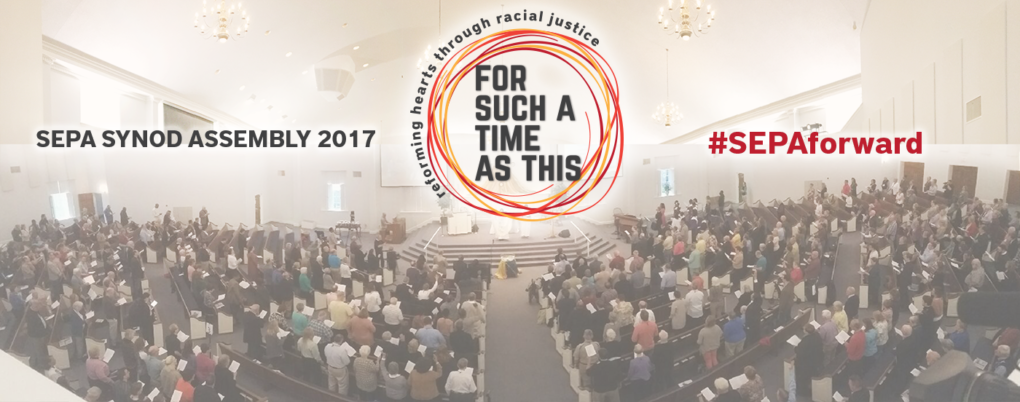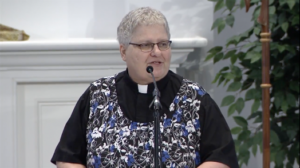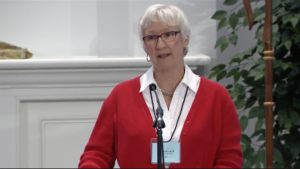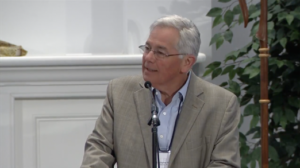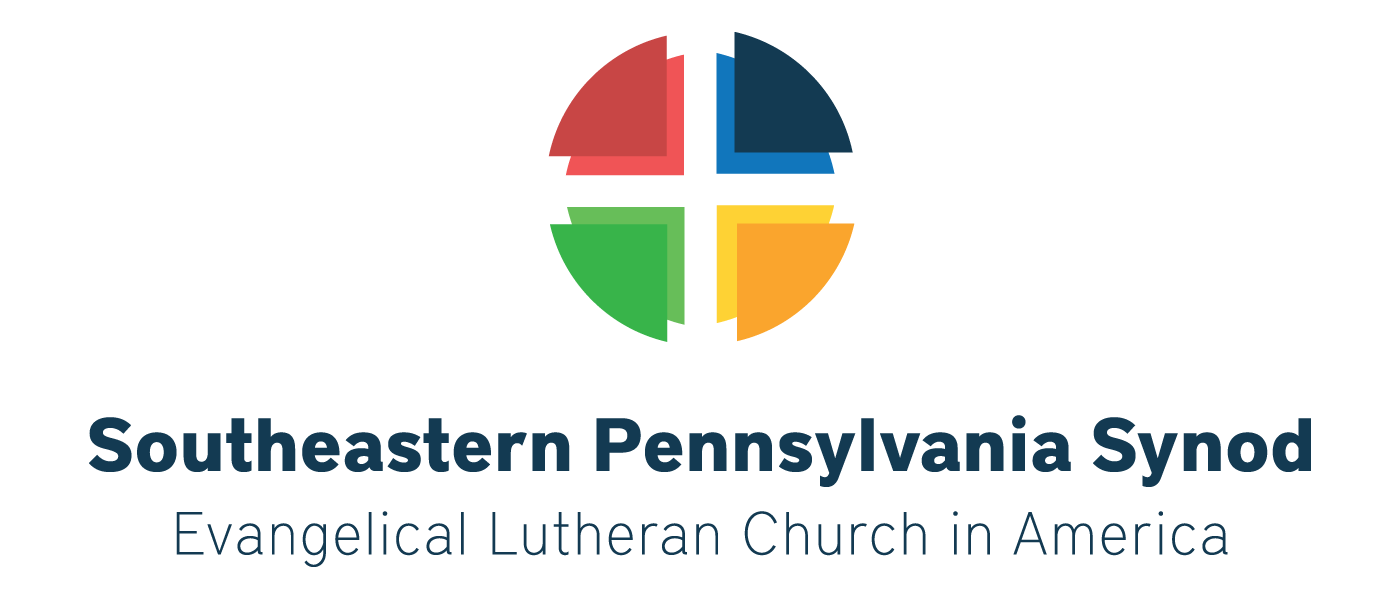2017 Assembly
Many voices offered perspectives on racism and reconciliation at the 2017 Southeastern Pennsylvania Synod Assembly May 5-6.
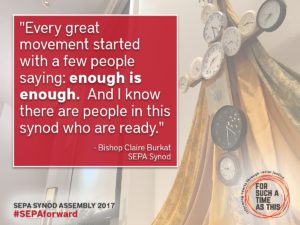 Bishop Claire Burkat encouraged those gathered to be “more open to engage, to explore, to repent, to be humbled, to align ourselves with this incredible and abundant new life in Christ.” She called on congregations and leaders to take steps this year to build relationships and listen to the stories of others. “We are on this road together to disrupt the system of evil by having the courage to address the complexities of race, class, and ethnicity,” the bishop said. “We are on this road together to proclaim that Christ changes everything.”
Bishop Claire Burkat encouraged those gathered to be “more open to engage, to explore, to repent, to be humbled, to align ourselves with this incredible and abundant new life in Christ.” She called on congregations and leaders to take steps this year to build relationships and listen to the stories of others. “We are on this road together to disrupt the system of evil by having the courage to address the complexities of race, class, and ethnicity,” the bishop said. “We are on this road together to proclaim that Christ changes everything.”
“Race is a human-made concept, but racism is very real,” said Judith Roberts, ELCA program director for racial justice. She led the Assembly through a series of conversations about how individual backgrounds and perceptions create our attitudes about race.
Though reconciliation is difficult and sometimes discouraging work, God accompanies us on the journey, the Rev. Carlton Rodgers said in a powerful sermon. “We can act as if black and blue lives matter, that brown and yellow lives matter, that white and red lives matter, because all lives matter in God’s eyes,”
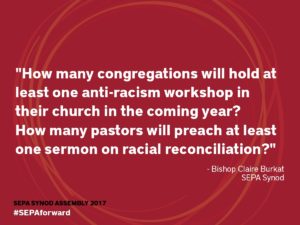 Members of the Synod Anti-Racism Team (ART) shared their stories of coming to understand the privilege that they carry and how that effects others. The bishop called on congregations to invite the team to lead conversations about race and reconciliation in their communities over the next year. “I had no idea how much implicit bias I was carrying around, nor did I grasp that my long life has been smoothed since birth by white privilege,” said team member Janet Bischoff. “It’s time for us…to get honest with ourselves. … We need to repent.”
Members of the Synod Anti-Racism Team (ART) shared their stories of coming to understand the privilege that they carry and how that effects others. The bishop called on congregations to invite the team to lead conversations about race and reconciliation in their communities over the next year. “I had no idea how much implicit bias I was carrying around, nor did I grasp that my long life has been smoothed since birth by white privilege,” said team member Janet Bischoff. “It’s time for us…to get honest with ourselves. … We need to repent.”
Worship planners had difficulty finding hymns appropriate to the topic of racial justice, so the Synod commissioned a new hymn, “Now is the Time” by composer Paul Freisen-Carper, that addresses our call to reconciliation. Congregations will be able to reproduce the hymn for worship through next April. The worship team also created a rite for Anti-Racism Confession and Reconciliation that was the centerpiece of Saturday morning’s worship. The text of the rite is available here.
In this 500th anniversary year of the Protestant Reformation, the Assembly also learned about the 2016 repudiation of the doctrine of discovery by the ELCA, voiced its support for refugees and immigrants, and learned of the kairos moments in the formation of United Lutheran Seminary. We also welcomed Deacons to the roster of Ministers of Word and Service during our opening Eucharist. — Bob Fisher
- Download an Assembly summary to print and share with your congregation: Assembly 2017 Summary
Bishop Burkat: “This is the acceptable time”
In her address to the assembly, Bishop Claire Burkat broke open possibilities to embody racial reconciliation in the work of congregations and the synod at large. The bishop encouraged those gathered to be “more open to engage, to explore, to repent, to be humbled, to align ourselves with this incredible and abundant new life in Christ.”
The bishop called for a “portable vision” that can be carried with us wherever we go.
“A vision more permeable, more accessible, more egalitarian, more authentic, more mobile, and certainly more communal than the shape of the church of the 20th Century, which means no person, no group, not even the church will be able to contain it.”
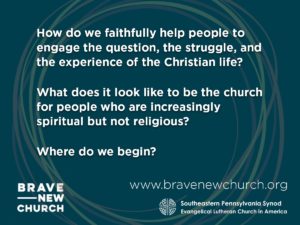 Noting the sweeping changes in church and society, the bishop announced the synod’s new ministry Brave New Church, created “to equip congregations to be pioneers of a bold, new kind of church for a rapidly changing world.” To support congregations, bravenewchurch.org, “a hub of resources and conversation partners is available to engage challenges and opportunities of ministry in a brave new world.”
Noting the sweeping changes in church and society, the bishop announced the synod’s new ministry Brave New Church, created “to equip congregations to be pioneers of a bold, new kind of church for a rapidly changing world.” To support congregations, bravenewchurch.org, “a hub of resources and conversation partners is available to engage challenges and opportunities of ministry in a brave new world.”
Calling upon a favorite image for the people of God, the bishop invites people once again to be ambassadors of Christ and ambassadors of racial reconciliation, where listening and relationship-building are the focus for our work.
“I’m hoping that next year at this time we can look back and be able to tell the stories of how God is working on our hearts, our relationships, our churches – calling us to be ambassadors of Christ. I want us to look back at this time and realize that Christ is in our midst, just as he was with the disciples at Emmaus. I want us to look back and say, were not our hearts burning within us?’ >>Read more
Is your church a vibrant faith community?
In her speech to the Assembly, Bishop Burkat offered some ideas for reflection in congregations:
Vibrant, visionary communities of faith make room and time, and set aside funds to strengthen spirituality and form faith in all sorts of ways for all sorts of people, coming from all sorts of places, any old time.
-
- How are your people being ambassadors for Christ? Inside and outside the church?
- How are you celebrating, not only counting, all the hands and heart-felt ministry you do?
- How can we identify, support, and bless the vocations of our people who are working in the world?
- How can we maximize the gifts among us already? How can we encourage risk-taking and diminish shaming and blaming?
Bishop: We are called to racial reconciliation
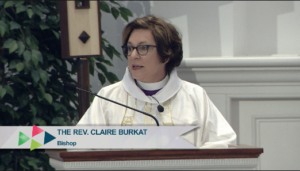 In her sermon, Bishop Claire Burkat expressed her confidence that members and congregations of the Southeastern Pennsylvania Synod are ready for conversation around racism and to do the work of racial reconciliation.
In her sermon, Bishop Claire Burkat expressed her confidence that members and congregations of the Southeastern Pennsylvania Synod are ready for conversation around racism and to do the work of racial reconciliation.
Recalling the recent powerful reconciliation work with the Mennonites, inspired by the anticipated 500th Anniversary of the Reformation, the bishop invited the synod to be heartened for the work ahead. Recalling the powerful words of the Apostle Paul, the bishop shared God’s invitation to embody resurrection in our relationships. And the support God offers as we do this.
“Everything old has passed away; see, everything has become new! All this is from God, who reconciled us to himself through Christ, and has given us the ministry of reconciliation; that is, in Christ God was reconciling the world to himself, not counting their trespasses against them, and entrusting the message of reconciliation to us.”
Sharing a personal story around racial reconciliation that opened her eyes to the power of speaking and listening to truth buried in pain, the bishop invited worshippers to hold the stories of others as gifts and as “Christ moments.”
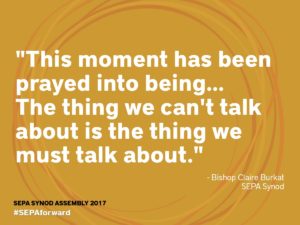 “Christ-moments aren’t Hallmark moments or cross-stitched pillow mottos. They are real moments of gut-wrenching realization that open our eyes on the Emmaus road. Like the disciples seared by the sight of the risen Christ as they shared a moment of heart-felt truth, I can look at that moment with [my friend] and say, ‘Was my heart not burning within me as she was talking to me on the porch?’ It was a kairos moment when the Divine truth intersected with our very human reality.”
“Christ-moments aren’t Hallmark moments or cross-stitched pillow mottos. They are real moments of gut-wrenching realization that open our eyes on the Emmaus road. Like the disciples seared by the sight of the risen Christ as they shared a moment of heart-felt truth, I can look at that moment with [my friend] and say, ‘Was my heart not burning within me as she was talking to me on the porch?’ It was a kairos moment when the Divine truth intersected with our very human reality.”
Casting a vision for what might be possible as we engage this work faithfully, the bishop invited the synod to remember the roads we walk together.
“We are on this road together to disrupt the system of evil by having the courage to address the complexities of race, class, and ethnicity. We are on this road together to proclaim that Christ changes everything. We are on this road together to make it plain: resurrection is borne out of cross-shaped pain that is transformed by God into new life.” >>Read more
Racial Reconciliation: “The choice is ours”
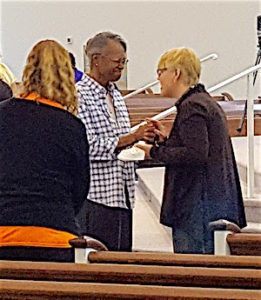 In Ephesians chapter 2, the Apostle Paul was “speaking to a church that was very much like our own,” a church divided by race and culture where historic majorities found themselves in the minority, the Rev. Carlton Rodgers said in a powerful sermon during Saturday morning’s worship. Those early Jewish Christians had to “look across the pews and see people who they thought were not worthy singing the same songs, praying the same prayers, governing on the same church councils.”
In Ephesians chapter 2, the Apostle Paul was “speaking to a church that was very much like our own,” a church divided by race and culture where historic majorities found themselves in the minority, the Rev. Carlton Rodgers said in a powerful sermon during Saturday morning’s worship. Those early Jewish Christians had to “look across the pews and see people who they thought were not worthy singing the same songs, praying the same prayers, governing on the same church councils.”
“Instead of focusing one differences, Paul urges the community to focus on the unity that we share in Jesus Christ,” said Rodgers, pastor of Tabernacle Lutheran Church, Philadelphia. “Instead of building walls of separation and exclusion, Paul talks of people coming together,” united by the “apostolic notion that Christ’s death on the cross was redemptive for everyone.”
As the apostle welcomed Gentile Christians as members of the household God, the church today “is on the front line of this cosmic battle between good and evil,” Rodgers said. In a racially divided America, “the problem is not color; the problem is sin.”
Rodgers exhorted those gathered “to show that we are of God” by building bridges of community and inclusion, changing the narrative to “be the church that is breaking down walls that separate.”
“We can act as if black and blue lives matter, that brown and yellow lives matter, that white and red lives matter, because all lives matter in God’s eyes,” Rodgers said. “There are no big “I’s” and little “you’s” in SEPA or in ELCA.” Though there is much work to do, and discouragement is ok, God is with us.
“There is hope today. We can be reconciled to each other today. We can be better today than we were yesterday. We can move forward together in faith, if we want to. The choice is ours.”
Judith Roberts: Racism is Very Real
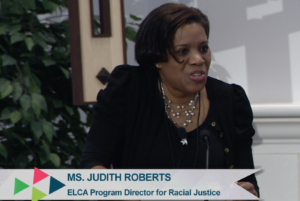 “Race is a human-made concept, but racism is very real,” Judith Roberts, ELCA Director for Racial Justice, told the 2017 Assembly. Roberts guided participants in beginning to understand the many factors that contribute to one’s view of race by sharing their own backgrounds and upbringing with one another in small-group conversations. Racism may show up as “microagressions,” everyday slights and indignities persons of color, women, LGBT individuals or other marginalized people experience in their day-to-day lives, Roberts said. Racism also has “macro” expressions including institutional and structural racism. How people see race is affected by their personal history, life experience, science, and other factors. Roberts’ advice is for individuals and congregations to educate themselves, which can lead to self- and community awakening. “We can then take that knowledge, do nothing, and perpetuate the cycle,” she said. “Or we can take the knowledge and change the community and world we live in.”
“Race is a human-made concept, but racism is very real,” Judith Roberts, ELCA Director for Racial Justice, told the 2017 Assembly. Roberts guided participants in beginning to understand the many factors that contribute to one’s view of race by sharing their own backgrounds and upbringing with one another in small-group conversations. Racism may show up as “microagressions,” everyday slights and indignities persons of color, women, LGBT individuals or other marginalized people experience in their day-to-day lives, Roberts said. Racism also has “macro” expressions including institutional and structural racism. How people see race is affected by their personal history, life experience, science, and other factors. Roberts’ advice is for individuals and congregations to educate themselves, which can lead to self- and community awakening. “We can then take that knowledge, do nothing, and perpetuate the cycle,” she said. “Or we can take the knowledge and change the community and world we live in.”
Anti-Racism Team: It’s Time to get to work!
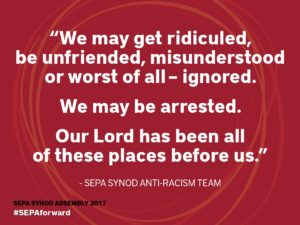 The Synod’s Anti-Racism Team (ART) is available to help lead your congregation understand racism as it exists in individuals, institutions, and societal structures, including our churches, and how to become allies with persons who live with this sin on a daily basis. Members of ART were present at the Synod Assembly to share their stories and lead two forums on the work of the team.
The Synod’s Anti-Racism Team (ART) is available to help lead your congregation understand racism as it exists in individuals, institutions, and societal structures, including our churches, and how to become allies with persons who live with this sin on a daily basis. Members of ART were present at the Synod Assembly to share their stories and lead two forums on the work of the team.
You can begin the process by inviting ART to your group for an introductory 2-hour overview. Once your group has committed to embark on this journey, the training encompasses 18-24 hours which can be customized to fit your group’s schedule (for example, the training could be done on 3 Saturdays consecutively or 3 Saturdays over the course of 3 months.) ART also invites you to join the team.
“The reason I participate is that this is not something we can leave to other people. Someone said yesterday that they hoped God will get this done. Well, God has been telling us to get it done forever.
“The only way this gets done is that God has given us these tasks at baptism, to love everyone, to love our brothers and sisters in Christ, to love the people that are with us all the time. That is what we are called to do.”
— The Rev. Susie Folks
“When I joined the anti-racism team last summer I had no idea how much implicit bias I was carrying around, nor did I grasp that my long life has been smoothed since birth by white privilege. I am starting to get it.
“The Lutheran Church, with it’s life-giving theology of grace…has always been culturally embedded in whiteness… It’s time for us…to get honest with ourselves. … We need to repent.”
— Ms. Janet Bischoff
.
“When it comes to waking up to the implicit bias through which I see others… when it comes to the unsought privilege that my unchosen skin color affords me in society… and when it comes to understanding how unfair laws and unchallenged cultural practices have shaped my life by an inheritance of institutional racism, not just unlearned habits of the heart, I tell you my eyes are just beginning to open.”
— The Rev. Christopher Weidner
Anti-Racism Team members: Janet Bischoff, Sem. Lenny Duncan, Chase Ferguson, Rev. Susie Folks*, Fern Hagedorn, Carrie Johnston, Rev. Gwen King, Rev. Linda Manson*, Rev. Jane Marston, Rev. Jay Mitchell, Karen Paulus, Rev. Chris Weidner. (*co-chairs)
Hymn, Rite of Reconciliation Available to Congregations
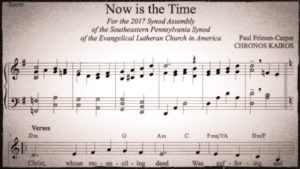 SEPA congregations may use the hymn commissioned for the Assembly, “Now is the Time,” in worship and may reproduce the hymn with permission for one year. The hymn by composer Paul Friesen-Carper is available as a lead sheet, accompaniment, and C-instrument score for download.
SEPA congregations may use the hymn commissioned for the Assembly, “Now is the Time,” in worship and may reproduce the hymn with permission for one year. The hymn by composer Paul Friesen-Carper is available as a lead sheet, accompaniment, and C-instrument score for download.
- Video of “Now is the Time” from Assembly worship
The worship team also provided a rite for Anti-Racism Confession and Reconciliation, which may also be downloaded and used by any congregation.
- Video of Anti-Racism Confession and Reconciliation from Assembly worship
Learning about the Doctrine of Discovery
The 2016 ELCA Churchwide Assembly repudiated the Doctrine of Discovery, a legal concept originating in the 15th Century that gave Christian explorers the right to claim and exploit lands occupied by non-Christians. The doctrine is enshrined in US law and Lutheran experience, as Lutherans coming to the Midwest moved onto what was called “Indian surplus land,” Prairie Rose Seminole, Director of American Indian-Alaska Native Ministries for the ELCA, told a 2017 Assembly forum. Taking of Indian land continues to happen today, and the doctrine has been cited in court decisions as recently as 2005. The ELCA is working with three dozen native congregations and working to open new ones, she said. The church is also working to educate native leaders in their communities. Reconciliation, though, will require building relationships to overcome long-standing disconnects, and honoring the dignity of native peoples, she said.
Assembly approves surplus budget
The Southeastern Pennsylvania Synod finished 2016 with a surplus despite the ongoing decline in mission support from congregations, Treasurer Janet Neff told the 2017 Assembly. The Assembly approved a 2018 budget which also anticipates a small surplus at the end of the fiscal year.
A Kairos Time for United Lutheran Seminary
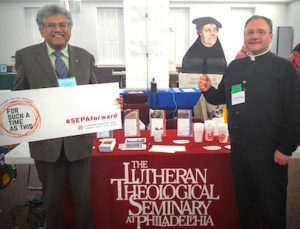 “The times are changing with rapidity, and we suddenly realized that we were in a kairos time” as the Philadelphia and Gettysburg Lutheran seminaries approach becoming United Lutheran Seminary (ULS), the Rev. Dr. J. Jayakiran Sebastian told the Assembly. Sebastian, currently dean at Philadelphia seminary, reported that it has been an “intense, challenging, and fulfilling journey” as the schools are coming together “in God’s good time” to form ULS.
“The times are changing with rapidity, and we suddenly realized that we were in a kairos time” as the Philadelphia and Gettysburg Lutheran seminaries approach becoming United Lutheran Seminary (ULS), the Rev. Dr. J. Jayakiran Sebastian told the Assembly. Sebastian, currently dean at Philadelphia seminary, reported that it has been an “intense, challenging, and fulfilling journey” as the schools are coming together “in God’s good time” to form ULS.
Sebastian premiered a video, “Imagine a Seminary,” featuring ULS President-Elect Theresa Latini and faculty and students from both schools. The video pointed out that ULS will be the most diverse Lutheran seminary in North America, both confessionally rooted and ecumenical. The curriculum will be integrative, experiential and empowering, and a witness of coming in union with Christ and one another.
Dean Sebastian introduced seminarian Leah Woehr-Grande, a senior and member of the last graduating class from LTSP. She thanked the synod and ELCA Fund for Leaders for scholarships which enabled her to complete seminary. She began as a student at LTSP in 2007, and has been a part of the LTSP community as it wrestled with determining what theological education could be. She sees the future school taking a new approach appropriate for the context we are in today,
He thanked SEPA Synod for the ongoing support from SEPA pastors and lay people, and offered thanks that SEPA led in Region 7 of the ELCA in investing in theological education and identifying people to serve in ministry. He is confident that all times are in God’s hands.
Bulletin of Reports and Supporting Documents
-
-
- Bulletin Of Reports 2017 (PDF, 9 MB)
- Addendum to Report of the Synod Council – 2016 Synod Assembly Minutes New!
- Friday Eucharist Worship Folder New!
- Forums New!
- Synod Constitution 2017a version New!
- SEPS Constitution 2016a New!
- Assembly Menus New!
- Maps New!
- MIF SEPA 2017 New!
- REVISED Mission Center Layout 2017 New!
- Additional Biographical Information for Floor Nominees
-
Resolution: Support of Welcoming Immigrants and Refugees (APPROVED)
One resolution was received by the deadline and will be considered by the Assembly:
-
-
- Resolution 1 Revised New!
-
Supporting documents
If other resolutions are considered by the Assembly they will be distributed in the hall and posted on the Assembly app.
